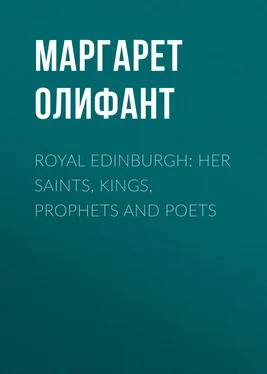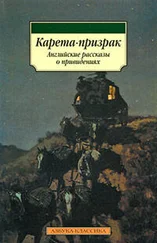Маргарет Олифант - Royal Edinburgh - Her Saints, Kings, Prophets and Poets
Здесь есть возможность читать онлайн «Маргарет Олифант - Royal Edinburgh - Her Saints, Kings, Prophets and Poets» — ознакомительный отрывок электронной книги совершенно бесплатно, а после прочтения отрывка купить полную версию. В некоторых случаях можно слушать аудио, скачать через торрент в формате fb2 и присутствует краткое содержание. Жанр: foreign_prose, История, literature_19, foreign_edu, foreign_antique, на английском языке. Описание произведения, (предисловие) а так же отзывы посетителей доступны на портале библиотеки ЛибКат.
- Название:Royal Edinburgh: Her Saints, Kings, Prophets and Poets
- Автор:
- Жанр:
- Год:неизвестен
- ISBN:нет данных
- Рейтинг книги:4 / 5. Голосов: 1
-
Избранное:Добавить в избранное
- Отзывы:
-
Ваша оценка:
- 80
- 1
- 2
- 3
- 4
- 5
Royal Edinburgh: Her Saints, Kings, Prophets and Poets: краткое содержание, описание и аннотация
Предлагаем к чтению аннотацию, описание, краткое содержание или предисловие (зависит от того, что написал сам автор книги «Royal Edinburgh: Her Saints, Kings, Prophets and Poets»). Если вы не нашли необходимую информацию о книге — напишите в комментариях, мы постараемся отыскать её.
Royal Edinburgh: Her Saints, Kings, Prophets and Poets — читать онлайн ознакомительный отрывок
Ниже представлен текст книги, разбитый по страницам. Система сохранения места последней прочитанной страницы, позволяет с удобством читать онлайн бесплатно книгу «Royal Edinburgh: Her Saints, Kings, Prophets and Poets», без необходимости каждый раз заново искать на чём Вы остановились. Поставьте закладку, и сможете в любой момент перейти на страницу, на которой закончили чтение.
Интервал:
Закладка:
It was scarcely possible however, short of a moral miracle, that such a thing could happen as the abandonment of the entire policy of the house of Douglas at a moment when their minds were embittered by so great a tragedy. The new Earl was not a mere soldier, still less a courtier, but a man of some culture, originally intended, it is said, for the Church, though this does not seem to have withheld him from taking part in the tumults of the time. Nor did it restrain him from marrying his brother's widow, the hapless Maid of Galloway, whose share of the Douglas lands made her indispensable to her two warlike cousins, though it seems uncertain whether either of the two marriages, which necessitated two dispensations from the Pope, was anything but nominal. After his submission James Douglas was employed as his brother had been in the arrangement of terms of truce with England, which was too great a temptation for him, and led to further treasonable negotiations. He would seem also to have renewed his brother's alliances with the rebels of the north: and in a very brief period the nominal peace and doubtful vows were all thrown to the winds, and this time there seems to have been no question of partial rebellion, but every indication that a civil war, rending the entire country in two, was about to break forth. Douglas had the strong backing of England behind him, the support of the Highland hordes always ready to be poured upon the peaceful country, and many great lords in his immediate train. He had raised an army of, it is said, forty thousand men, an enormous army for Scotland, and it was evident that the struggle was one of life and death.
At this moment it would seem that King James for the first time lost heart. He had been fighting during all the beginning of the year 1455, reducing the west and south, the Douglas country, to subjection and desolation. But when he found himself menaced by an army as great as anything he could muster, with the angry north in the background and clouds of half-savage warriors on the horizon, the King's heart sank. He is said to have left Edinburgh in disgust and depression, and taken ship at Leith for St. Andrews, to seek counsel from the best and most trustworthy of his advisers, a man whose noble presence appears in the distracted history with such a calm and sagacious steadfastness that we can well understand the agitated King's sudden impulse towards him at this painful period of his career. Bishop Kennedy had himself suffered from the lawlessness of the Douglas retainers: and he too had royal blood in his veins. He occupied one of the highest positions in the Church, and his wisdom and strength had made him one of the most prominent statesmen in the kingdom. James arrived hastily, according to the chronicle, unexpected, and with many signs of distress and anxiety. He betrayed to the Bishop his weariness of the ever-renewed struggle, and of the falsehood and treachery which, even if victorious, were all he had to encounter, the failure of every pledge and promise, the faith sworn one day which failed him the next, and the deep discouragement with all things round him which had taken possession of his mind. The wise prelate heard this confession of heart-sickness and despondency, and with a fatherly familiarity bade the young King sit down to meat, which he much wanted, while he himself went to his oratory to pray for enlightenment. That James thought no less than to throw up the struggle and retire from his kingdom, is what the old writers say. But when, with his bosom lightened by utterance of his trouble, and his courage a little restored by food and rest, the Bishop came back to him with a cheerful countenance from his prayers, the King took heart again. Kennedy produced to him the old image of the sheaf of arrows which, bound together, were not to be broken, but one by one could easily be snapt asunder, and advised him to make proclamation of a free pardon to all who would throw down their arms and make submission, and to march at once against the rebel host with full confidence of victory. Inspired by this advice, and by the companionship of the Bishop who went with him, the King set out to meet the rebels, though with an army inferior in number to theirs. Douglas, from some unexplained reason, wavered and hesitated, taking no active step, and gave Bishop Kennedy time to put his own suggestion in practice in respect to his nephew Lord Hamilton—who was one of Douglas's chief supporters—sending secret messengers to him to urge him to submission. Hamilton no doubt had already perceived signs of wavering purpose and insecurity in the heterogeneous host, in which were many whose hearts failed them at sight of the King's banners—men who were apt to rebellion without being wound up to the extreme point of civil war: but he had "ane kyndlie love to Earl Douglas" as well as a regard for his own honour, and would not lightly desert his friend. While thus uncertain he appealed to Douglas to know what he meant to do, warning him that the longer he hesitated, the less would be the forces at his disposal. Douglas replied haughtily that if he were tired of waiting he might go when he pleased—an indiscreet answer, which decided Hamilton to withdraw and throw himself upon the King's promised mercy. The same night he went over to the royal army, carrying with him so many that "on the morn thereafter the Earl Douglas had not ane hunder men by his own household," the whole host having melted away. Never was a greater risk for a monarchy nor a more easy and bloodless escape. The Earl fled to the depths of his own country and thence to England, where he lived long a pensioned dependant, after all his greatness and ambition, to reappear in history only like a ghost after many silent years.
Amid all these bewildering and bitter struggles, in which much misery was no doubt involved, it is recorded of the King that he never lost his humane character, and that even in the devastations he was forced to sanction or command, the cruel reprisals carried out over all the south of Scotland, his severity was always tempered with mercy. "He was not so much feared as a king as loved like a father," says Major. This luminous trait appears through all the darkness of the vexed and furious time. The King was always ready to pardon at a word, to believe in the vows and receive the submission of the fiercest rebels. One curious evidence of the confidence felt in him was shown by the widow of the murdered Earl, Margaret Douglas, the Maid of Galloway, a woman doubly injured in every relation—the sister of the young Earl murdered at Edinburgh, married by his successor in order to reunite the Douglas patrimony, a great portion of which went to her as her brother's heir—and again forced into another and unlawful marriage by her husband's brother, immediately upon his death, for the same end. James received this fugitive kindly, restored to her part of the lands of her family, and finally married her—thus freeing her from the lawless bond into which she had been driven—to his own step-brother, John, Earl of Atholl, "the Black Knight of Lorne's son;" upon hearing of which another fugitive of a similar description appeared upon the scene.
"When the Earl of Ross's wyff understood the King to be some pairt favourable to all that sought his grace she fled also under his protection to eschew the cruel tyranny of her husband, which she dreaded sometyme before. The King called to remembrance that this woman was married not by her own counsel to Donald of the Isles (the Earl of Ross). He gave her also sufficient lands and living whereon she might live according to her estate."
The case of women, and especially heiresses, in that lawless age must have been miserable indeed. Bandied about from one marriage to another, forced to accept such security as a more or less powerful lord could give, and when he was killed to fall victim to the next who could seize upon her, or to whom she should be allotted by feudal suzerain or chieftain, the mere name of a king who did not disdain a woman's plaint, but had compassion and help to give, must have conveyed hope to many an unhappy lady bound to a repugnant life. James would seem to have been the only man who recognised the misery to which such unconsidered items in the wild and tumultuous course of affairs might be driven.
Читать дальшеИнтервал:
Закладка:
Похожие книги на «Royal Edinburgh: Her Saints, Kings, Prophets and Poets»
Представляем Вашему вниманию похожие книги на «Royal Edinburgh: Her Saints, Kings, Prophets and Poets» списком для выбора. Мы отобрали схожую по названию и смыслу литературу в надежде предоставить читателям больше вариантов отыскать новые, интересные, ещё непрочитанные произведения.
Обсуждение, отзывы о книге «Royal Edinburgh: Her Saints, Kings, Prophets and Poets» и просто собственные мнения читателей. Оставьте ваши комментарии, напишите, что Вы думаете о произведении, его смысле или главных героях. Укажите что конкретно понравилось, а что нет, и почему Вы так считаете.












